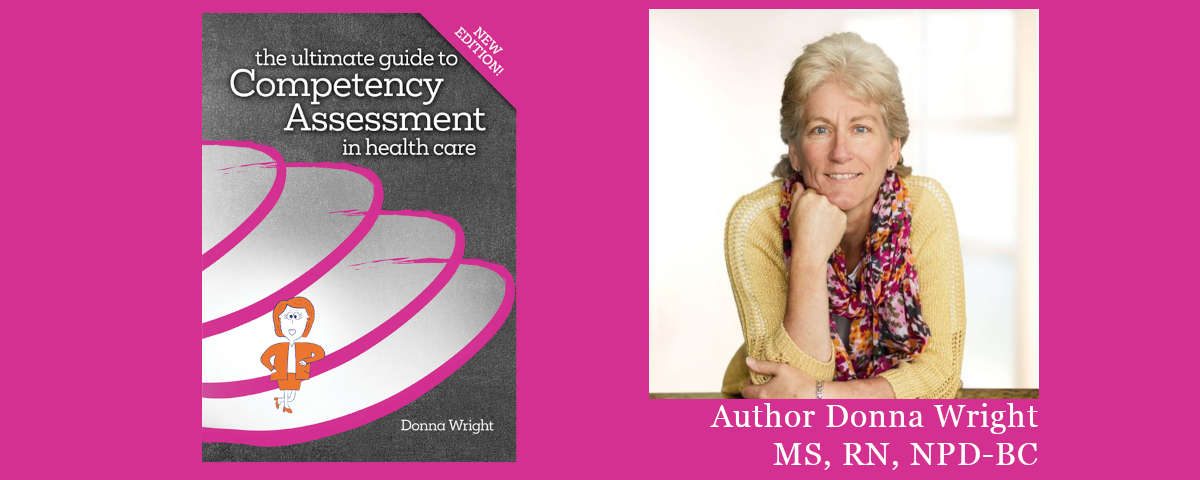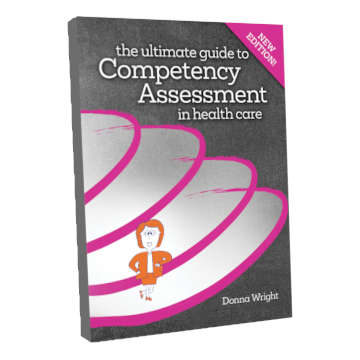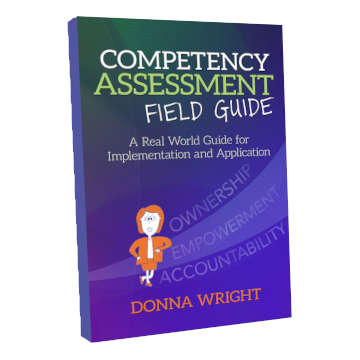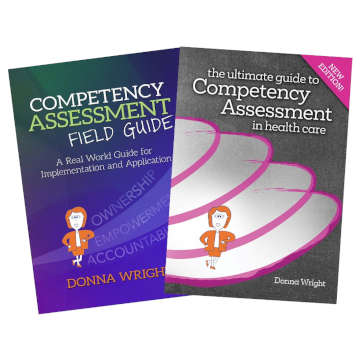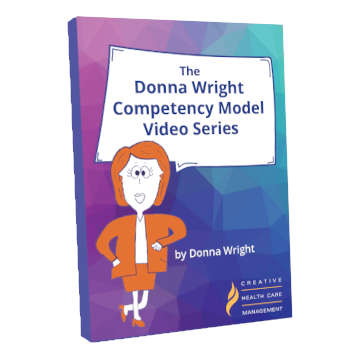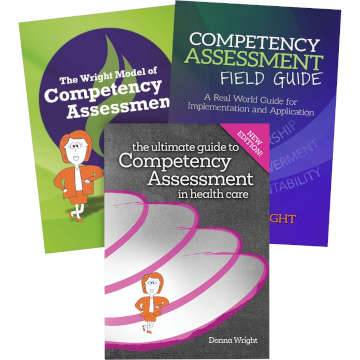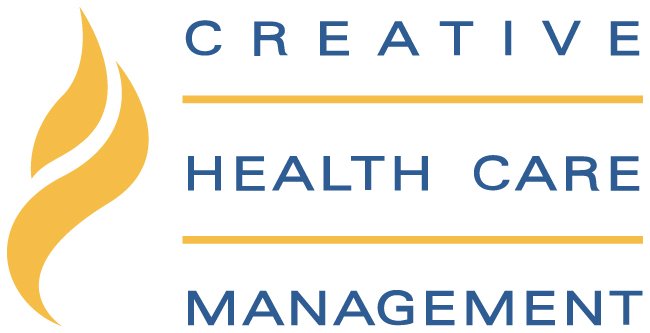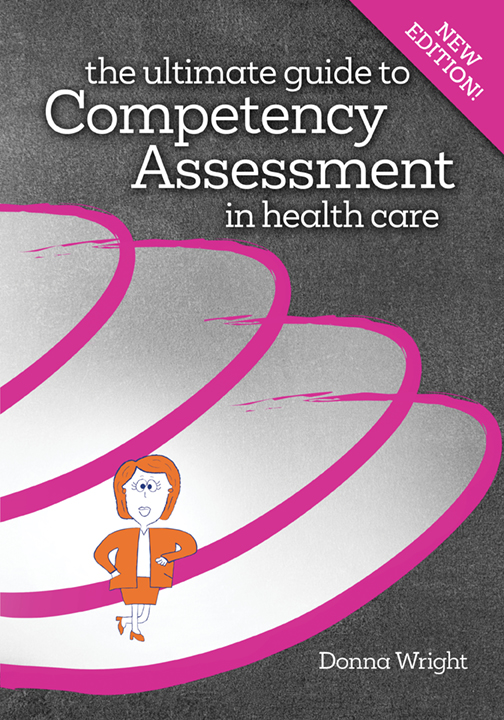
Creative Health Care Management Inc. is thrilled to announce the release of a new and updated book “The Ultimate Guide to Competency Assessment in Health Care”. The newest competency based resource available to help identify competencies, select and manage competencies, and determine the ultimate effectiveness of your competency program.
Fourth Edition Book
This fourth edition book, focuses on how competency based assessments work, how do you assess competency, how organizations can create training plans to make the competency process more meaningful, dynamic and focused, and provides examples from the pandemic that allowed hospitals to be more nimble and responsive during a critical time.
The fundamentals of Donna Wright’s beloved competency model have not changed, but this edition has a new chapter with a focus on initial competencies for the development of competency requirements for new employees on the job. The purpose of initial competency assessment is to answer the basic question of, can this new hire work independently?
What are Competency Assessments?
Competency assessment helps identify and evaluate the knowledge, skills, abilities, and behaviors needed to carry out a job or future jobs. The competency assessment system assesses the core competencies, knowledge, and specific skill set for the proficiency level of current employees.
Organizations engage in competency assessment to: evaluate employee individual or group job performance, to meet standards set by a regulatory agency, or to address problematic issues and gaps.
Competency can be described as the application of employee knowledge, skills and behaviors that are used in performing job tasks that are specific to their role. Typically, this is one of the key components of an employee’s performance and progress that are part of the competency based assessment.
Competency Based Assessment
Wright’s competency model focuses on ownership, empowerment and accountability. It’s not a cumbersome competency assessment system loaded with comprehensive checklists of skills required for each job.
A competency assessment, is an evaluation or assessment of the capabilities of an employee that are measured against their job requirements to assure employees and caregivers are delivering the best possible care to patients, residents, and other customers. Competency based assessments are used to recognize potential problems with an employee’s performance and to correct those issues. Competency assessments can also be used to enhance or replace a performance review.
Competency Based Assessment Comparison
In order for the skills assessment data to be valuable, it must be compared against the organizational growth of the company. A role based competency model should contain only skills and tasks that are critical to the success of the role of the organization, not every activity they perform in their job (which comes from a traditional job task analysis).
Accountability in the Competency Assessment Process
To make competency assessment successful, expectations and accountabilities of both employees and managers must articulated. Each employee is accountable to verify the identified competencies for their job category.
While employees are accountable for verifying their own identified competencies, this does not mean the they do a “self-assessment.” Instead they are responsible for collecting evidence that demonstrates their individual competencies. This places accountability for competency assessment on each individual, and takes the manager out of the role of evaluator. The manager’s role is to establish systems that support competency assessment for current and future jobs, not to do assessments for employees.
Holding employees accountable for providing verification of their own competencies not only promotes employee accountability, but enables managers to be more productive as coaches.
Competency Assessment Data
Tracking competency assessment data trends in the organization is an essential element to the successful growth of the organization. Collecting and reviewing trends of the aggregate data is required by many regulatory groups (such as Joint Commission). The analysis of trends is also essential for organizational capability, development and strategic planning.
Benefits of a Competency Assessment
The benefits of a competency assessment include understanding the skills levels of each employee based upon the competency based assessment that creates lifelong learning and a target level to those who are assessed.
Employers do not always understand what the organization lacks, and this assessment determines the skills set to promote real growth among employees in the organization as well as to develop a talent acquisition strategy .
Competency Based Assessments: Employee Performance Inventory
Using competency assessments allows employers to understand development needs and any skill gap of employees to better understand what is necessary to make the organization better.
Competency Based Assessment: Creating Better Training for Continuous Learning
A successful performance review strategy will inform organizational plans and involve more than one single assessment of an employees skills.
The development of organizational skills are occurring at a faster and faster rate, to the point where there can be a data void. In the business world required skills are often obsolete by the time an employee is trained on new skills.
Soft skills or relational skills are very necessary in health care. We often focus on the technical skills, but relational skills are just as important.
Task Based Mentoring
Task based mentoring from team leaders is important when creating the plan to make sure valuable employees are trained.
A key role in a successful business is beginning to center around consistent competency assessments as well as self assessment that are gear towards the future and around a notion of continual individual reskill gap reinvention.
Assessment Cycles
Competency assessment needs to function on a cyclical basis where everyone starts and ends at the same time. Competency assessment does not cycle in alignment with employee anniversary dates. Performance review can be done on anniversary date, but competency assessment must be done on a cyclical basis. This is because competency based assessment focuses on the job category—articulating the ever-changing nature of that job. It is not focused on the individual, but instead on what skills are needed to currently do the job. Therefore all people in the job category must have the same start and end deadlines. Failing to keep these start and end dates consistent for everyone involved can cause a number of contractual and legal issues.
Identifies Skills Gaps
Competency assessments identify if employees are at or below the required skill set, often determining if there is a skill gap or not. Team members technical or relational soft skills might be below the standard that is required of them.
If the employee has skill gaps and is not deemed competent in their job class, level, or duties, an action plan must be documented. The action plan should evaluate competencies and identify gaps. Problematic aspects or high risk aspects for ongoing competencies or specific competencies, require development for the employee to include the actions that can be applied by the employee and the manager, and to provide a deadline for the actions to be reviewed.
The Ultimate Guide to Competency Assessment in Health Care – 4th edition
Creative Health Care Management Inc. has released a new 4th edition version of the book, “The Ultimate Guide to Competency Assessment in Health Care” This highly practical book will help you create a more meaningful, dynamic competency system that is neither cumbersome nor labor intensive.
Packed with tools to select competencies, verify competencies, and define the whole process, The Ultimate Guide to Competency Assessment in Health Care is a must have for your resource toolbox. With over 50,000 copies sold worldwide, this book has become the industry standard for competency assessment.
The assessment is performed on those identified tasks and skills for which a rating is selected based upon how they do that task, which defines their proficiency level. In other words, a competency assessment measures how (behaviors) someone does the what (task or skill).

